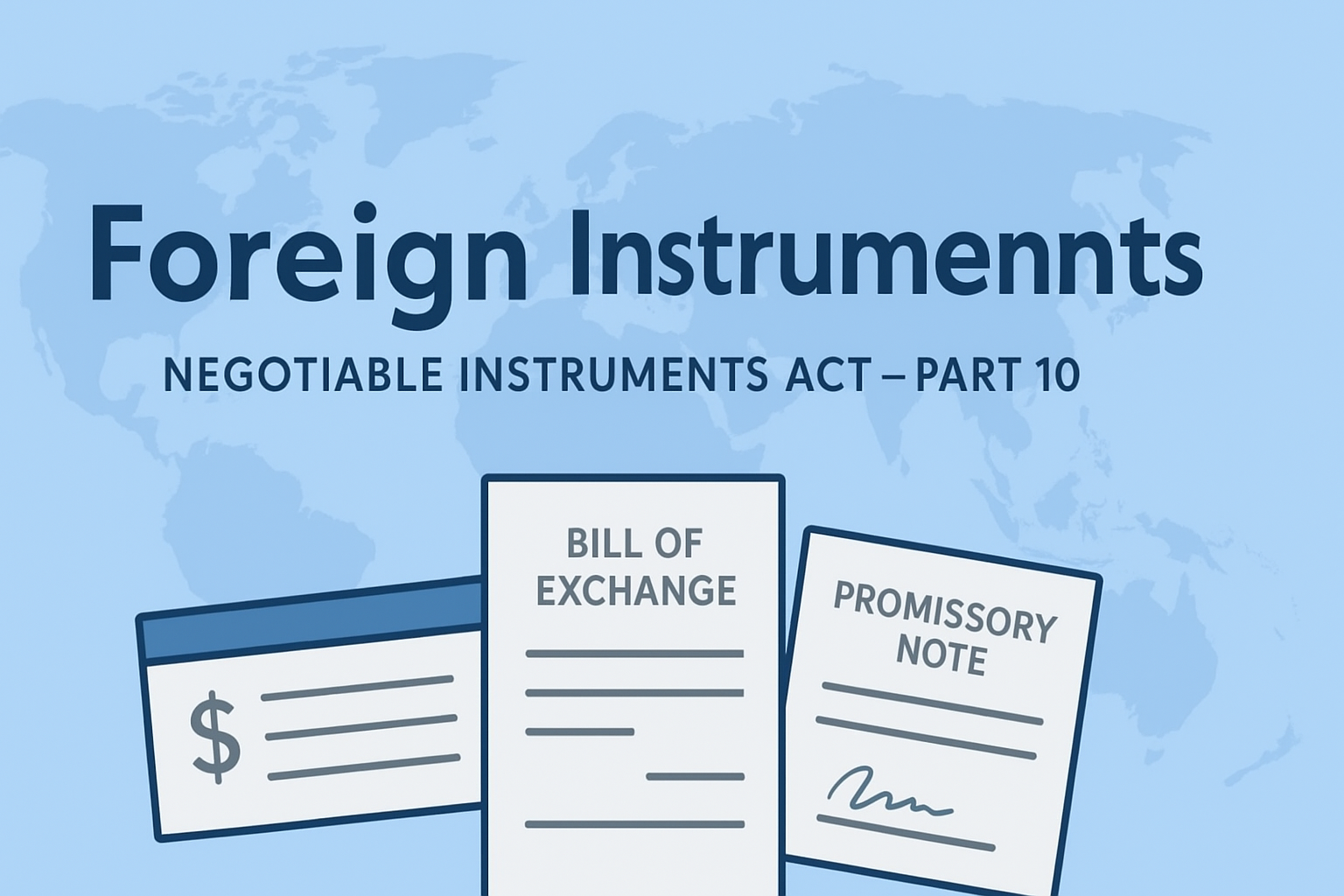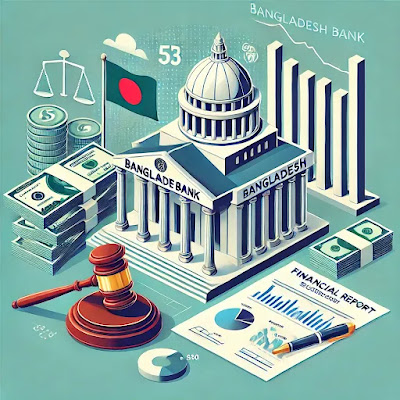Negotiable Instruments • Banking Exams
Foreign Instruments: Definition, Features, Differences & Examples
A foreign instrument is a negotiable instrument (cheque, bill of exchange, or promissory note) that introduces a foreign element—e.g., drawn or made outside Bangladesh, or made in Bangladesh but payable outside Bangladesh, or drawn upon a person not resident in Bangladesh. In short: if either drawing/place of payment or drawee’s residence is foreign, it is a foreign instrument. Table of Contents
- Meaning
- Key Features
- Foreign vs Inland
- Practical Examples
- Banker Considerations (Risk & Compliance)
- Exam Pointers
- FAQs
- Quick MCQ Practice
- বাংলা নোট
1) Meaning
An instrument becomes foreign when at least one of these applies:
- Place of drawing/making: Outside Bangladesh.
- Place of payment: Outside Bangladesh.
- Drawee/resident: Drawn upon a person not resident in Bangladesh.
Memory hook: Any foreign link in draw / pay / party ⇒ foreign instrument.
2) Key Features
Cross-border element: Currency, place, or party is foreign.
Conflict of laws: May involve different legal systems.
Presentation & protest: Foreign bills may require protest as per foreign law/practice.
Exchange risk: Settlement may involve FX conversion & charges.
Banking channels: Collection through correspondent banks.
Time frames: Clearing/realisation generally longer than inland items.
3) Foreign vs Inland Instruments
AspectForeign InstrumentInland Instrument Place of DrawingOutside Bangladesh (or by non-resident)Within Bangladesh Place of PaymentOutside BangladeshWithin Bangladesh / to a resident PartiesMay involve non-resident partiesGenerally resident parties Governing LawForeign law may apply wholly/partlyBangladesh NI Act applies Bank ProcessingThrough international/foreign correspondentsDomestic clearing RisksFX, time lag, legal enforcement abroadLower cross-border risk
4) Practical Examples
- A cheque drawn in Kolkata, payable at Mumbai (foreign for Bangladesh context).
- A bill drawn in Dhaka but payable in London.
- A promissory note drawn in Chittagong on a non-resident drawee in Singapore.
Tip: “Drawn here, paid abroad” or “drawn abroad, paid here”—both are foreign.
5) Banker Considerations (Risk & Compliance)
- Endorsement & documentary checks: Ensure continuous endorsements and documentary compliance as per collecting/paying country rules.
- Protest/Noting: Some foreign bills require protest for dishonour—check correspondent instructions.
- FX conversion: Apply correct exchange rate, fees, and regulatory reporting (e.g., central bank guidelines).
- Sanctions & AML/CFT: Screen parties/countries; obtain purpose of remittance where applicable.
- Time & recourse: Manage customer expectations for longer realisation periods and limited recourse.
6) Exam Pointers
- Keyword trio: foreign draw • foreign pay • foreign party.
- Opposite term: Inland Instrument (drawn/payable within Bangladesh or to resident).
- Practice: Foreign bills may need protest for dishonour depending on local law.
7) FAQs
Is a cheque drawn in Dhaka but payable in Kuala Lumpur foreign?
Yes. Since payment is outside Bangladesh, it is a foreign instrument. Do foreign instruments always involve foreign currency?
No. The currency may be BDT or foreign; the foreign element can be place or parties. Who bears exchange risk?
Usually the presenter/beneficiary unless the contract states otherwise. Banks disclose applicable rates and fees.
8) Quick MCQ Practice
- An instrument is foreign if:
(a) Drawn in Bangladesh and payable in Bangladesh only (b) Drawn abroad or payable abroad or on a non-resident (c) Signed by two parties (d) None
Answer: (b) - Which is not a typical feature of foreign instruments?
(a) FX exposure (b) Longer collection time (c) Purely domestic jurisdiction (d) Need for correspondent banking
Answer: (c) - A bill drawn in Chittagong on a resident in Bangkok is:
(a) Inland (b) Foreign
Answer: (b)
9) বাংলা নোট (Bangladesh Context)
Foreign instrument বলতে বোঝায়—যে ইন্সট্রুমেন্টে বিদেশি উপাদান আছে; যেমন বিদেশে তৈরি/ড্র করা, বিদেশে পরিশোধযোগ্য, অথবা নন-রেসিডেন্ট ব্যক্তির উপর ড্র করা। অর্থাৎ draw, pay বা party—এই তিনটির যেকোনো একটিতে বিদেশি সংযোগ থাকলেই সেটি foreign।
Posted in: Banking Law & Practice | Series: Negotiable Instruments — Part 10 (Foreign Instruments)
Prepared for: Banking Professional Exam Assistant




